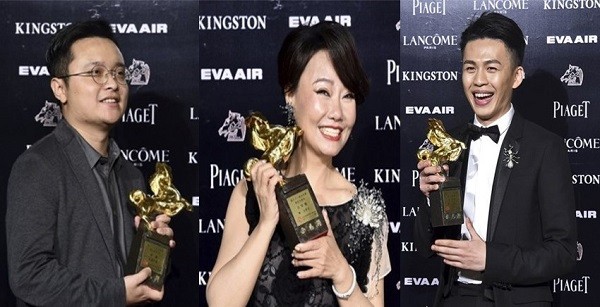There is always a first time for everyone.
As for those in the entertainment industry in East Asia, that defining moment happened during the 52nd Golden Horse Awards held on Nov. 21 at the Sun Yat-sen Memorial Hall in Taipei, Taiwan.
Bi Gan’s mystery drama “Kaili Blues” gave him the Best New Director award.
Writing for the official website of the Vancouver International Film Festival (VIFF), Shelly Kraicer described Bi’s work as “remarkable, dreamlike, intensely poetic.” Derek Elley of Film Business Asia called the movie “conventionally enigmatic.”
As they say in showbiz, there is no such thing as a small role, and Lu Xue-feng (“Flavor of Life,” “Dear Mom”) proved it once more by bringing home the Best Supporting Actress trophy that night. The 51-year-old actress tackled the role of an alcoholic mother in Chang Tso-chi’s drama, “Thanatos, Drunk.”
This is the second time Lu and Chang (“A Time in Quchi,” “How Are You, Dad?”) worked together.
The 53-year-old Taiwanese directed her in the 2010 drama, “When Love Comes.” Lu got her first Golden Horse Awards Best Supporting Actress nomination because of this movie.
Chang’s “The Best of Times” (2002) and “When Love Comes” won Best Feature Film during the 39th (Nov. 16, 2002) and 47th (Nov. 20, 2010) editions of the Golden Horse Awards, respectively.
American entertainment magazine Variety, on its online edition, labels Rat, Lu’s son in the movie, as “an anguished punk.”
Taiwanese actor Lee Hong-chi must have delivered a powerful performance to make the juror empathize with his anguish as Rat that he received the Best New Performer award.
In ancient Greek religion and mythology, Thanatos is “the personification of death,” according to Encyclopedia Britannica.
Speaking of death, Taiwanese director Hou Hsiao-hsien’s martial arts film, “The Assassin,” killed many hopefuls as it grabbed five awards, including Best Director for Hou.
Hou’s action drama, which is set in ninth-century China and top-billed by Taiwanese actors Shu Qi and Chang Chen, earned 11 nominations.
“The Assassin” won in the following categories: Best Feature Film, Best Cinematography (Lee Ping Bin aka Mark Lee), Best Sound Effects (Chu Shih-yi, Tu Duu-chih and Wu Shu-yao) and Best Makeup and Costume Design (Hwarng Wern-ying), according to Focus Taiwan News Channel.
In terms of acting, it was a gradual affirmation of sorts for the Hong Kong-based Taiwanese singer-actress Karena Lam.
The 39th Golden Horse Awards declared Lam Best New Performer and Best Supporting Actress for her role as a 17-year-old student in Ann Hui’s 2002 drama, “July Rhapsody.”
At the 45th Golden Horse Awards in 2008, the 37-year-old Canadian-born Lam earned a Best Actress nomination for playing Pearl, an employee who fell in love with her married boss in Ivy Ho’s romantic drama, “Claustrophobia.”
This year’s edition bestowed the Best Actress award to Lam for her performance in Lin Shu-yu’s (Tom Lin) drama, “Zinnia Flower.”
Taiwanese model-actress Lin Chi-ling and TV host-comedian-actor Mickey Huang hosted the awards night.




























